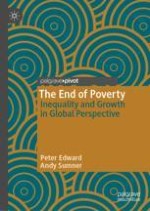2019 | OriginalPaper | Chapter
2. Growth and Distribution Since the Cold War
Authors : Peter Edward, Andy Sumner
Published in: The End of Poverty
Publisher: Springer International Publishing
Activate our intelligent search to find suitable subject content or patents.
Select sections of text to find matching patents with Artificial Intelligence. powered by
Select sections of text to find additional relevant content using AI-assisted search. powered by
